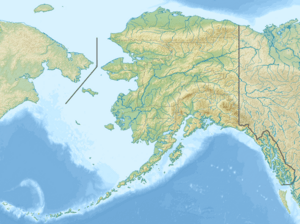Wind River (Yukon–Koyukuk Census Area, Alaska) facts for kids
Quick facts for kids Wind River |
|
|---|---|
|
Location of the mouth of Wind River in Alaska
|
|
| Country | United States |
| State | Alaska |
| District | North Slope Borough, Yukon–Koyukuk Census Area |
| Physical characteristics | |
| Main source | Philip Smith Mountains of the Brooks Range Windy Glacier, Arctic National Wildlife Refuge 4,798 ft (1,462 m) 68°34′31″N 147°24′17″W / 68.57528°N 147.40472°W |
| River mouth | East Fork Chandalar River 39 miles (63 km) northwest of Christian 1,699 ft (518 m) 67°46′36″N 146°09′27″W / 67.77667°N 146.15750°W |
| Type: | Wild |
| Designated: | December 2, 1980 |
The Wind River is a beautiful river located in Alaska, one of the United States. It's like a smaller stream that flows into a bigger river. The Wind River joins the East Fork Chandalar River, which then eventually flows into the huge Yukon River.
Contents
About the Wind River
The Wind River starts high up in the Philip Smith Mountains. These mountains are part of the larger Brooks Range in northern Alaska. The river's journey begins in a very wild and untouched area.
Where Does it Flow?
The river flows through a remote part of Alaska. It travels through the North Slope Borough and the Yukon–Koyukuk Census Area. These areas are known for their vast wilderness.
A Special River
The Wind River is not just any river; it's a National Wild and Scenic River. This means it's protected by the government because of its amazing natural beauty and importance.
What "Wild" Means
In 1980, about 140 miles (230 km) of the Wind River were given a special "wild" designation. This means these parts of the river are kept in their natural state. They are free-flowing and mostly undeveloped. This helps protect the river's environment and wildlife.
Part of a Refuge
All the designated "wild" sections of the Wind River are found inside the Arctic National Wildlife Refuge. This refuge is a huge protected area. It's a safe home for many animals and plants in the Arctic.
 | Percy Lavon Julian |
 | Katherine Johnson |
 | George Washington Carver |
 | Annie Easley |


